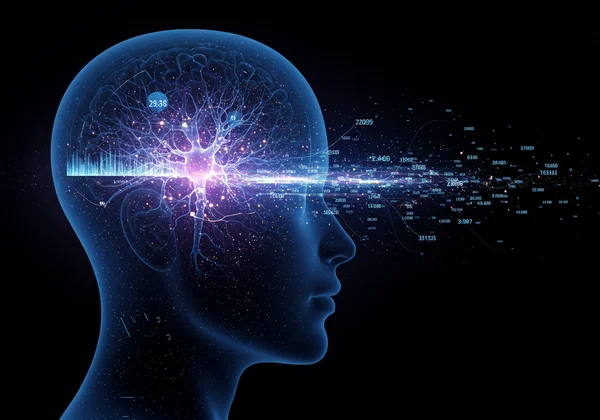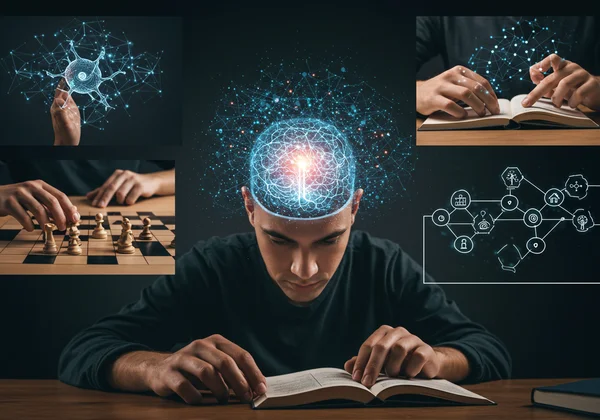Cognitive Assessment & Brain Boost: Actionable Strategies to Improve Cognitive Function
September 15, 2025 | By Gideon Albright
You’ve taken a cognitive assessment, or you're thinking about it, and the results are a starting point. They offer a fascinating snapshot of your mental strengths and areas with potential for growth. But what’s the next step? Many people wonder, how can I check my cognitive ability at home? and more importantly, how can I actively improve cognitive function? This guide will walk you through turning the valuable insights from an assessment into a powerful action plan for a sharper, more resilient mind.
Your journey to better brain health isn't about perfect scores; it's about understanding your unique cognitive profile and making intentional, daily choices that support your mental vitality. The first step is always to establish a clear baseline of your abilities. An AI-powered [online cognitive assessment] provides precisely the detailed, personalized insights you need to begin. This guide will walk you through scientifically-backed strategies to help you leverage your strengths and enhance your cognitive skills for a healthier, more vibrant life.

Understanding Your Cognitive Assessment: Turning Insights into Action
A comprehensive cognitive report is more than just data—it's a unique plan to help you improve. Instead of viewing it as a final grade, see it as the beginning of a conversation with your own mind. The goal is to use this information to build targeted habits that foster long-term mental fitness and well-being.
Decoding Your Report: Strengths, Challenges, & Opportunities
Your results likely highlight different cognitive domains, such as memory, attention, executive function, and processing speed. The first step is to embrace the full picture. Celebrate your strengths—these are the skills you can lean on and even use to support other areas. For example, strong problem-solving skills can help you devise creative memory strategies.
Challenges are not weaknesses; they are opportunities for growth. An AI-driven report, like the one you can get after our [cognitive assessment for adults], goes beyond simple scores. It identifies specific patterns and provides actionable insights, turning a number into a clear path forward. Understanding that your challenge lies in sustained attention, for instance, allows you to focus on specific exercises and lifestyle changes that directly target that skill.
Setting Personalized Goals for Cognitive Improvement
With your report decoded, you can set meaningful, personalized goals. Vague ambitions like "get smarter" are less effective than specific targets. Use the SMART goal framework: Specific, Measurable, Achievable, Relevant, and Time-Bound.
For example, if your assessment indicated a challenge with short-term memory, a SMART goal could be: "For the next 30 days, I will practice a memory-enhancing technique, like the method of loci, for 10 minutes daily to remember my grocery list without writing it down." This goal is specific, measurable, and achievable. It's relevant to a daily task and has a clear timeline, making it easier to stick with and track. A [free cognitive assessment] can help you identify which goals are most relevant to you.
Everyday Brain Health Tips: Lifestyle for a Sharper Mind
Improving cognitive function isn't just about brain teasers and puzzles; it's deeply connected to your daily lifestyle. The choices you make regarding diet, sleep, exercise, and stress management form the foundation of your mental acuity. These habits work together to create an internal environment where your brain can thrive.

Fueling Your Mind: Nutrition and Hydration Strategies
What you eat directly impacts your brain's structure and function. Think of food as fuel for your mind. To optimize cognitive performance, focus on a diet rich in antioxidants, healthy fats, vitamins, and minerals. Foods like blueberries, fatty fish (rich in Omega-3s), nuts, seeds, and leafy greens have been shown to support brain health and protect against age-related decline.
Hydration is equally critical. Even mild dehydration can impair attention, memory, and other cognitive skills. Your brain is approximately 75% water, and keeping it hydrated is essential for maintaining optimal function. Aim to drink water consistently throughout the day to ensure your brain has the resources it needs for peak performance and mental clarity.
The Power of Rest: Sleep's Role in Memory and Focus
Sleep is not a passive state; it's a vital period of restoration and consolidation for your brain. During deep sleep, your brain clears out toxins that accumulate during waking hours and strengthens the neural connections that form memories. Consistently poor sleep can lead to difficulties with focus, learning, and emotional regulation.
To improve your sleep hygiene, create a relaxing bedtime routine, maintain a consistent sleep schedule, and ensure your bedroom is dark, quiet, and cool. Prioritizing 7-9 hours of quality sleep per night is one of the most powerful things you can do to enhance both memory and focus.
Moving for Mental Clarity: Physical Activity and Your Brain
Physical exercise is as beneficial for your brain as it is for your body. Aerobic activities like brisk walking, swimming, or cycling increase blood flow to the brain, delivering essential oxygen and nutrients. Exercise also stimulates the release of growth factors that support the health of brain cells and encourage the growth of new neurons.
You don't need to run a marathon to reap the benefits. Just 30 minutes of moderate-intensity exercise most days of the week can significantly boost your mood, reduce stress, and improve cognitive function. Getting active is a fantastic way to sharpen your mind and build resilience.
Managing Stress: Protecting Your Cognitive Resources
Chronic stress can be toxic to your brain. When you're constantly stressed, your body releases high levels of the hormone cortisol, which can damage the hippocampus—a brain region crucial for learning and memory. Finding effective ways to manage stress is essential for protecting your long-term cognitive health.
Practices like mindfulness meditation, deep breathing exercises, yoga, or spending time in nature can help lower stress levels. These activities calm your nervous system and can even promote structural changes in the brain that enhance focus and emotional control.
Engaging Cognitive Exercises: Boost Your Mental Fitness
Just as physical exercise strengthens your muscles, targeted mental workouts can enhance your cognitive abilities. Engaging in novel and challenging activities stimulates your brain, builds new neural pathways, and improves your overall mental fitness. Integrating these exercises into your routine can be both fun and incredibly beneficial.

Sharpening Your Memory: Activities for Better Recall
To improve your memory, you need to challenge it regularly. Move beyond simple repetition and engage in activities that require active recall. Try learning a new language, memorizing a poem, or practicing visualization techniques where you create vivid mental pictures of things you want to remember.
Mnemonic devices are powerful tools for encoding and retrieving information. Techniques like creating acronyms or using the "method of loci" (memory palace) can transform difficult-to-remember facts into memorable stories or images. You can use a memory test to track your progress.
Enhancing Attention & Focus: Drills for a Distracted World
In our hyper-connected world, the ability to focus is an invaluable skill. You can train your attention just like a muscle. Mindfulness meditation is one of the most effective attention drills, teaching you to bring your focus back to the present moment whenever it wanders.
Another practical technique is the Pomodoro Method: work in focused 25-minute intervals, followed by a short break. This helps build your stamina for sustained concentration and prevents mental fatigue. Deliberately unplugging from digital distractions for set periods each day also gives your brain a much-needed opportunity to reset.
Challenging Executive Functions: Problem-Solving & Planning
Executive functions are the high-level mental skills that help you plan, organize, and execute tasks. These abilities are crucial for achieving long-term goals. To strengthen them, engage in activities that require strategic thinking and complex problem-solving.
Strategy games like chess or Sudoku are excellent workouts for your executive functions. You can also challenge yourself with real-world projects, such as planning a detailed trip, learning a new instrument, or taking on a complex task at work that requires you to break it down into smaller, manageable steps.
Building a Sustainable Plan for Ongoing Cognitive Improvement
The key to lasting cognitive enhancement is not a quick fix but a sustainable lifestyle. Lasting change comes from integrating small, positive habits into your daily life and staying committed to the journey of self-improvement. Your brain's ability to adapt and grow—a concept known as neuroplasticity—means you can continue to build a sharper mind at any age.
Consistency is Key: Integrating Habits into Your Routine
Small, consistent efforts compound over time. Instead of overwhelming yourself with a complete overhaul, start by incorporating one or two new habits into your routine. Perhaps you’ll begin with a 10-minute walk each day or swap a sugary snack for a handful of nuts.
The goal is to make these new behaviors automatic. Attach them to existing habits—a practice known as habit stacking. For example, "After I finish my morning coffee, I will do a 5-minute breathing exercise." By making your new habits easy and consistent, you create a foundation for long-term success.
Tracking Progress & Staying Motivated on Your Journey
Staying motivated is easier when you can see your progress. Periodically re-evaluating your cognitive skills provides valuable feedback and helps you adjust your plan. Taking a [Cognitive Assessment Test] every few months allows you to objectively measure improvements and identify new areas to focus on.
![]()
This process of assessment, action, and reassessment creates a cycle that fuels motivation. Celebrate your successes along the way, no matter how small. Recognizing your progress reinforces your commitment and turns the pursuit of brain health into a rewarding and lifelong journey. You can start your cognitive assessment journey today.
Your Cognitive Journey Continues: Embrace Growth & a Sharper Mind
Improving your cognitive function is an empowering and continuous journey, not a destination. By understanding your unique cognitive profile, embracing healthy lifestyle habits, and engaging in targeted mental exercises, you are taking active control of your brain health. Each positive choice you make contributes to a more resilient, focused, and vibrant mind.
Remember, the first step to improvement is awareness. Understanding your current cognitive strengths and challenges is the key to unlocking your full potential. Are you ready to begin? Take our comprehensive, AI-driven [cognitive assessment] to receive your personalized report and start your journey toward a sharper mind today.
Frequently Asked Questions About Improving Cognitive Health
How can I check my cognitive ability at home?
The most reliable way to check your cognitive ability at home is by using a scientifically designed online tool, such as our comprehensive, AI-powered cognitive skills assessment test created by neuropsychologists and AI experts. It provides a detailed report on various domains like memory, attention, and executive function, giving you a clear and actionable baseline from the comfort of your home.
What are some simple ways to improve memory after a cognitive assessment?
After an assessment, you can focus on simple yet powerful habits. Prioritize 7-9 hours of quality sleep each night, as this is when your brain consolidates memories. Incorporate brain-healthy foods like fatty fish, berries, and nuts into your diet. Finally, challenge your mind daily by learning a new skill, reading a book, or playing strategy games.
What happens if my cognitive test results suggest a decline?
Receiving results that suggest a cognitive decline can be concerning, but it's important to view them as a call to action, not a diagnosis. These results are a valuable starting point for a conversation with a healthcare professional, such as your GP. They can provide context, recommend further steps, and help you create a proactive plan for managing your brain health. Remember, our tool is for insight and guidance, not for clinical diagnosis.
Why is regular cognitive assessment important for brain health?
Regular cognitive assessment acts as a "check-up" for your brain. It helps you establish a baseline of your cognitive function, allowing you to track changes over time. This proactive approach enables you to identify potential issues early, measure the effectiveness of your lifestyle changes, and make informed decisions to support your long-term mental vitality. A regular [brain health check] empowers you to take an active role in managing one of your most valuable assets.